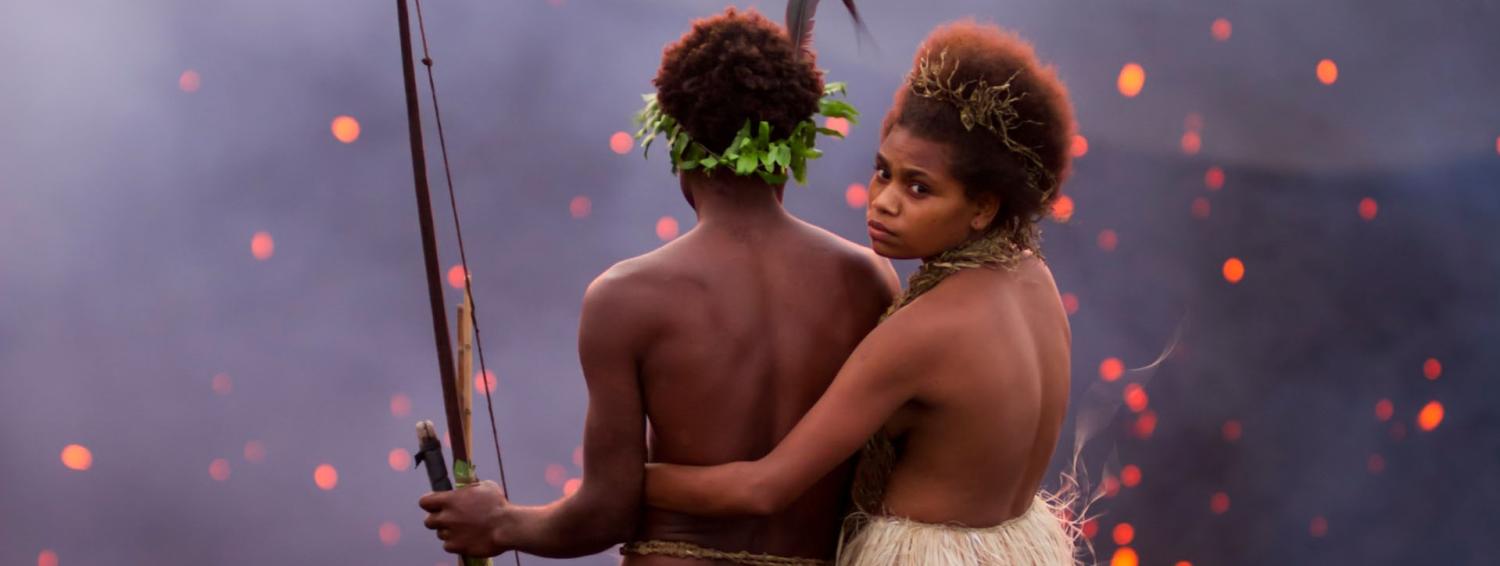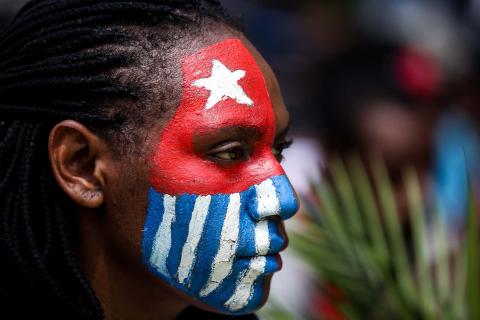The Pacific is abuzz with the news that the film Tanna, released in 2015, has been nominated for an Academy Award in the Best Foreign Language Film category. Directed by Australian documentary-makers Bentley Dean and Martin Butler, the film was shot entirely on the island of Tanna in the southern end of Vanuatu’s archipelago. It is the home of the Yakel people, one of the few remaining communities that has chosen to live according to tradition, or kastom. It is the Yakel people who sit at the heart of this film.
Kastom loosely translates from Bislama (the pidgin English spoken in Vanuatu), to 'custom' but the connotations of the word go well beyond English understanding. Kastom pertains to the traditional culture of the islands. Vanuatu is one of the most ethno-linguistically diverse countries in the world; Kastom is a common word, used to unite the traditional practices of Vanuatu’s many different cultural groups.
The Yakel people are committed to retaining kastom, rejecting Christianity and Western influences such as formal education, in order to live (for the most part) as their ancestors have. However, as we see from the film, this is not always easy and the movie explores how the community has navigated the challenge of maintaining their culture. The film is based on a true story from the late 1980s of forbidden love between two young Yakel, which changed the tribe’s arranged marriage customs forever. The storyline draws links with Romeo and Juliet, in that the protagonists Dain and Wawa are destined for an epic, yet tragic, love.
The directors and the third screenwriter, John Collee, collaborated with the Yakel people to write the script for Tanna entirely in the indigenous language of the village, Nauvhal. The film was shot using the Yakel village as the set, and its people as the cast. These first-time actors offer outstanding performances throughout the film.
The directors had the support of gifted translators like the Cultural Director, JJ Nako, and the staff of the Vanuatu Cultural Centre (Dan McGarry tells the funny story of searching for JJ on the day the nomination was announced and the mild reception the news received in Vanuatu here). The Cultural Centre has strict procedures that ensured the film-making process was in no way exploitative. The directors have spoken of the challenge of taking a story of the Yakel people and making it accessible for a Western audience. That was how the love story came to play a central role in the film.
Chief Charlie, seeing himself on screen, commented on the strength of kastom in the film, saying 'the message I give at the end of the film is powerful'. The final quote from Chief Charlie is: 'we’ve always fought to keep kastom strong. The colonial powers – we resisted. The Christians – we resisted. The lure of money – we resisted that also'. This compelling ending to the film makes clear the difficulty of maintaining kastom.
Overall, the film offers audiences rare exposure to a little known way of life. Even audiences in Australia have little understanding of the cultures of our region, despite our proximity and the numbers of Australian tourists who visit Vanuatu every year. Tourism in Vanuatu centres around the capital, Port Vila. Traditional culture plays some role in tourism promotion, but visitors' cultural experiences are often limited.
Following the story of Dain, Wawa, their families and communities (in their language, under the shadow of the volcano Mt Yasur, through the jungle and onto the beaches of their island) allows viewers to put themselves in the Yakel people’s bare feet in a way that far transcends a one-day custom village tour that a tourist might take.
For a place with such rich culture, community and landscape, there is very little literature or cinema set in Vanuatu. The texts that do exist are often dominated by Western protagonists, where the local people and their values are part of the exotic backdrop of 'paradise'. Directors Dean and Butler have made clear choices to promote an inclusive filming process. Ultimately, it is their strong collaboration with the Yakel tribe which has allowed them to make a film that offers a sensitive representation of one of the remaining kastom tribes in the region.
The film has been criticised for overly romanticising the Yakel way of life. For example, the film depicts a carefree childhood, and a ready supply of food and water. The harsher realities of a rural kastom life, such as a lack of medical care, food shortages and the impacts of natural disasters, are not depicted. In fact, Tanna was one of the islands hardest hit by Cyclone Pam in 2015.
Yet it's clear that the directors of Tanna are striving to offer a representative portrayal, giving the characters and traditions the respect they deserve. This film has given audiences across the world the opportunity to learn about kastom village life and most importantly, it has represented this way of life as a valid choice.
The Vanuatu Government recognises the importance of kastom for its people. Culture is the foundation of the recently launched National Sustainable Development Plan, Vanuatu 2030: The People’s Plan, developed over the last three years with extensive public consultation. Speaking to ABC’s Pacific Beat, Lands Minister Ralph Regenvanu said the plan is about modernisation while also preserving the values enshrined in Vanuatu’s constitution that come from both kastom and Christianity. While not all ni-Vanuatu are as strongly wedded to kastom as the Yakel, it still plays a significant role country-wide.
The Oscar nomination for Tanna has brought even more international attention to the film and the issues it explores. It is a well-deserved nomination. Good films transport viewers inside the lives and worlds of their characters; Tanna takes us inside an ancient yet contemporary world that very few people will ever experience.


